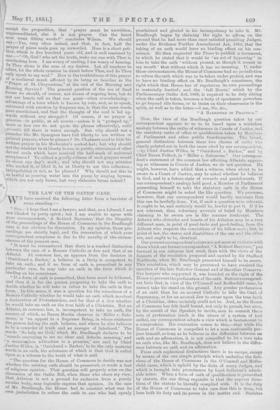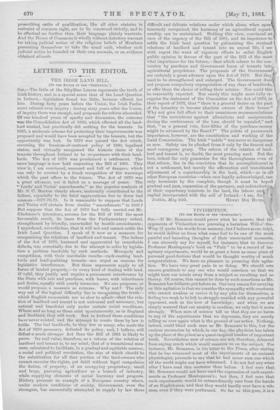THE LAW OF THE OATHS' CASE. 1 4E have received the
following letter from a barrister of some standing :—
" Sin,—I hope that I am a lawyer, and that, as a Liberal, I am not blinded by party spirit ; but I am unable to agree with your correspondent,' A Retired Barrister,' that the illegality of the proceedings of the House of Commons in the Bradlaugh ease is too obvious for discussion. In my opinion, those pro- ceedings are strictly legal, and the innovation of which your .correspondent complains is due to the novelty of the circum- stances of the present case.
" It must be remembered that there is a marked distinction between the case of a Roman Catholic or Jew and that of an Atheist At common law, as appears from the decision in ' Omichund v. Barker,' a believer in a Deity is competent to take an oath ; and if no form of oath is prescribed in any .particular case, he may take an oath in the form which is binding en his conscience.
" If a form of oath is prescribed, that form must be followed, and then it is for the person proposing to take the oath to -decide whether he will take or refuse to take the oath in that ',arm. In this sense, it was a question for the conscience of a Roman Catholic whether he would take an oath which involved ,a declaration of Protestantism, and for that of a Jew whether ho would. take an oath on the true faith of a Christian. But an .Atheist, at common law, is incompetent to take an oath, the .essence of which, as Baron Martin observes Miller v. Salo- mous,' is ` au appeal to a Supreme Being, in whose existence the person taking the oath believes, and whom he also believes -to be a rewarder of truth and an avenger of falsehood.' rhe -words ' So help me God,' which Mr. Bradlaugh declares to be 'sounds conveying to inc no clear and definite meaning,' and `a meanimgless addendum to a promise,' are said by Chief justice Willes, iu Omichuud v. Barker,' to be the only material words in an oath, the substance of which is that God is called -upon as a witness to the truth of what is said.
"The question for the House of Commons to decide was not whether the existing oath should be preserved, or made a test -of religious opinion. That question will properly arise on the discussion of the Oaths Bill, when those who share my view, -that ,A.theisin is not a ground for exclusion from a purely .secular body, may logically express that opinion. In the case of Mr. Bradlaugh, the House had to consider what was its -own jurisdiction to refuse the oath to one who had openly
proclaimed and gloried in his incompetency to take it. Mr. Bradlaugh began by claiming the right to affirm, on the ground that he had more than once satisfied presiding- Judges, under the Evidence Further Amendment Act, 1869, that the taking of an oath would have no binding effect on his con- science. He then requested the Times to publish a document, in which he stated that it would be an act of hypocrisy' in him to take the oath ' without protest, as though it meant in my mouth' that without which it has no meaning. If, under those circumstances, the House of Commons had no jurisdiction to refuse the oath which was to be taken under protest, and was to have no binding effect on Mr. Bradlaugh's conscience, the right which that House has of regulating its own proceedings is materially limited ; and the 'full House,' which by the Parliamentary Oaths Act, 1866, is required to be duly sitting when the oath is taken, becomes a body of spectators powerless to go beyond idle forms, or to insist ou their observance in the spirit, as well as in the lotter.—I am, Sir, &c., "A BARRISTER IN PRACTICE."
Now, the view of the Bradlaugh question taken by our correspondent appears to us to be based upon a mistaken .
analogy between the oaths of witnesses in Courts of Justice, and the statutory oaths of office or qualification taken by Members of Parliament and other public functionaries. The broad,
general distinction between these two classes of oaths NVZ/.1 clearly pointed out in both the cases cited by our correspondent, —by Chief Justice Willes, in. " Omichund v. Barker," and by Chief Baron Pollock, in " Miller v. Salomons." Our correspon- dent's statement of the common law affecting Atheists appear- ing as witnesses in Courts of Justice, we do not question. He might, however, have added that a witness, when about to be sworn in a Court of Justice, may be asked whether he believes in God, and in a future state of rewards and punishments. If our correspondent's analogy held good, a Member of Parliament presenting himself to take the statutory oath in the House of Commons might be asked the like question. We presume,. however, that our correspondent would hardly maintain that this can be lawfully done. Yet, if such a question were relevant, it ought to be, and certainly would be, lawful to put it. If it be not relevant, then voluntary avowals of belief by Members claiming to be sworn are in like manner irrelevant. The Atheist who obtrudes and boasts of his Atheism may be a very different man, in point of good-taste and good-feeliug, from the Atheist who respects the convictions of his fellow-men ; but, in point of law, the status and disabilities of the one and the other are, and ought to be, identical. Our present correspondent's views are not more at variance with those which our former correspondent," A Retired Barrister," put forward in our columns last week, than with the views of the framers of the resolution proposed and carried by Sir Stafford Northcoto, when Mr. Bradlaugh presented himself to be sworn. This resolution, which may be presumed to have received the sanction of the late Solicitor-General and of the other Conserva- tive lawyers who supported it, was founded on the right of the House to prevent the profanation of the oath. But our correspond- ent feels that, in view of the O'Connell and Rothschild cases, he cannot take his stand on this ground. Any greater profanation of an oath than for an avowed Catholic to take the Oath of Supremacy, or for an avowed. Jew to swear upon the true faith of a Christian, there certainly could not be. And, as the House of Commons has felt itself bound, not only to permit, but even, by the mouth of the Speaker, to invite, men to commit these acts of profanation (such is the stress of a system of test oaths), our correspondent adopts a view which is tantamount to a compromise. His contention comes to this,—that while the House of Commons is compelled to let a man confessedly per- jure himself, so long as he believes in the difference between an oath and an affirmation, it is not compelled to let a man take an oath who, like Mr. Bradlaugh, does not believe in the differ- ence between an oath and an affirmation.
From such sophistical distinctions there is no escape, except by means of the one simple principle which underlies the deci- sions of the House of Commons in the O'Connell and Roths- child cases, which is upheld by the dicta of many Judges, and which is brought into prominence by Lord Selborne's admir- able letter. When a form of oath of qualification is prescribed by statute, the one thing requisite is that the express direc- tions of the statute be literally complied with. It is the duty of the House of Commons to take care that this is done, but here both its duty and its power in the matter cud. Statutes prescribing oaths of qualification, like all other statutes in restraint of common right, are to be construed strictly, and to be effectual no further than their language plainly warrants, And the House of Commons is wholly without statutory warrant for taking judicial notice of the religious beliefs of Members presenting themselves to take the usual oath, whether such judicial notice be founded on their own avowals, or on evidence obtained aliundo,



































 Previous page
Previous page